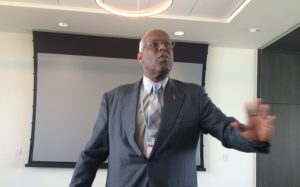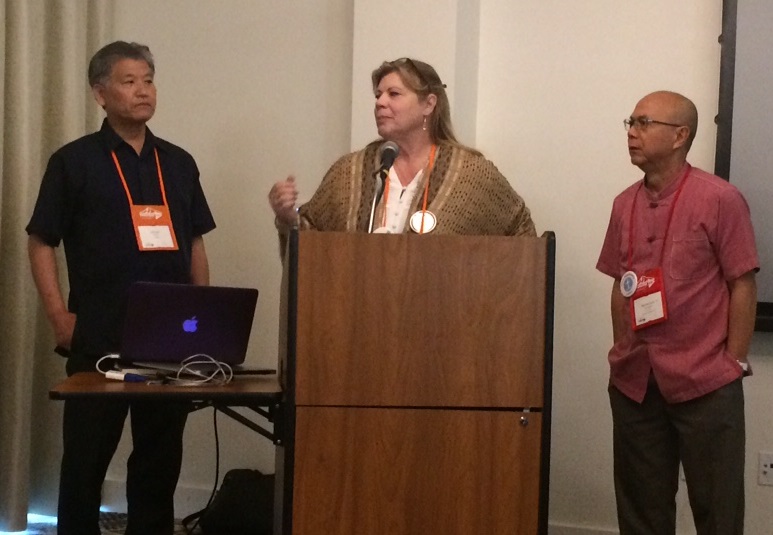Advocates for the United Methodist Church to divest itself of financial holdings in companies that do business with Israel attempted to showcase international, multi-ethnic and missionary support at a May 11 gathering.
United Methodist Kairos Response (UMKR) hosted brief talks by several bishops and ethnic caucus officials supportive of their cause. More than 40 percent of delegates to the denomination’s quadrennial General Conference are from overseas. American, Filipino and Palestinian presenters offered their support, but no African United Methodists spoke, despite two being scheduled to give comments.
General Conference is gathered May 10-20 in Portland, Oregon and is expected to consider various competing resolutions directing the church’s pension board about how to invest in the Holy Land.
Sponsors screened a short video, “From The Heart: United Methodist Missionaries Speak Out” which endorsed a divestment strategy removing companies that do business with Israel from church investment portfolios.
Speakers told of Palestinian farmers’ olive groves uprooted on the eve of harvest and water diverted to fill the swimming pools of Israeli settler communities. Lethal attacks against Israelis by militant groups such as Hamas were unmentioned.
“Every UMC missionary to the Holy Land supports divestment as a means of ending the occupation,” announced one UMKR presenter.
Among the missionaries appearing in the video was General Board of Global Ministries (GBGM) official Janet Lahr Lewis, who stirred controversy in 2015 after she authored an article in a General Board of Church and Society (GBCS) newsletter calling for Christians to boycott Holocaust museums until equivalent facilities are built to commemorate the Palestinian Nakba (catastrophe). The article was later removed from the GBCS web site.
“We have seen injustices that many of you have not seen — we have heard testimonies that many of you have not heard,” asserted UMC missionary Bob May. “I’ve seen Israeli soldiers violently kicking handcuffed Palestinians as they lie in the dirt.”
May cited the construction of Israeli settlements and “daily humiliation” Palestinians suffer.
“I have seen the progression of injustice due to the separation wall, the construction of Israeli bypass roads,” reported Brenda Awad of Bethlehem Bible College.
The missionaries advocated that United Methodists cease buying products “that sustain the occupation” and defended the strategy as a “nonviolent means to bring peace with justice”.
“It’s not enough to pray for peace, be an active person working for justice in the Holy Land,” charged Alex Awad of Bethlehem Bible College. “You need to work very hard to make that peace a reality.”
Bishop Warner Brown, President of UMC Council of Bishops, advocated “helping overcome distorted propaganda” by helping people to “see with their own eyes” and visit the Holy Land. Trips to Holy Land that are not well planned are like “going to Disneyland so that we can see how Africa is,” Brown charged. “If the same lie gets told enough and enough, the people that tell it begin to seem credible.”

Brown recalled a visit to Hebron in which he saw netting overhanging businesses.
“That’s to protect the businesses because Israelis whenever they choose will throw feces and whatever they choose down upon the street,” Warner asserted, alleging harassment by Israeli settlers who are protected by armed escorts.
Palestinian Christian Student Areej Masoud from Bethlehem Bible College described a strategy of boycott, divestment and sanctions (BDS) as a “just, nonviolent tool — a form of pressure that is a peaceful form of resistance that places pressure on Israel until it complies with international law.”
Other groups at General Conference have taken issue with the strategy, charging that it is counter-productive in fostering a narrative leading to peace.
Bishop Ciriaco Francisco of the Philippines’ Davao Episcopal Area introduced the Lumad people in the island of Mindanao, an indigenous group in conflict with the ruling Philippine administration over land rights. Representatives from the group declared that their cause was the same as that of Palestinian liberation, with one declaring “long live international solidarity!”
Pacific Northwest Bishop Grant Hagiya also spoke in support of divestment policy, asserting that “Wesley would prophetically speak out against our system that has accumulated so much wealth and not to lose some of that for justice.”
Hagiya, a Japanese-American, told of his family’s loss of their business during Japanese internment in World War II, while Native American International Caucus Chair Cynthia Kent recalled adversity experienced by her people. Both equated the present situation of Palestinians to injustices their ancestors experienced.
United Methodist officials from the Southern Nigeria Annual Conference and Mozambique Episcopal Area were also scheduled to speak, but did not appear at the gathering.
UMKR began in 2010 in response to the 2009 Kairos Palestine document, a letter issued by some Palestinian Christians urging that overseas Christians “combat violence and brutality of the occupation” with boycotts and divestment, which they labeled a “nonviolent expression”.





Comment by DannyBoyJr on May 12, 2016 at 8:13 pm
I don’t understand how the Davao bishop could compare the Lumads with the Palestinians. Lumads are a dwindling minority who does not have an armed conflict with the government. Plus, there is also ambiguity as to who is actually attacking them. Some claim it is government soldiers, others say it is armed communist rebels.
I think it is improper to seek divestment, especially when our own conference in the Philippines are reaping the benefits of monetary aid from our denominational leaders in the US.
Comment by D.Ben Meir on May 13, 2016 at 3:48 am
Those who wish to contribute to peace in the Holy Land should meet with Jews who live in Judea and Samaria. You would learn that it is not true that olive trees are uprooted or that water is divered to fill swimming pools. These are libels akin to the blood libel against Jews. Is that the level or your organization?
The security fence (mostly NOT a “wall”) was built because of the Arab suicide bombers. If you really want pwace – teach the Muslim Arabs to be tolerant of others who are not Arabs and are not Muslims. Teach them to accept that the Jews have returned to their ancestral homeland, which comprises just one per cent of the lands under Arab rule.
Comment by drofmanythings on May 15, 2016 at 9:15 am
Amen.
Comment by Lancelot Camelot on May 13, 2016 at 12:26 pm
The Church must through Church councils and declarations, combat anti-Semitic “heretical replacement theology” and promote philo-Semitic theology https://www.facebook.com/notes/chivalry-for-life-and-liberty/anti-semitic-and-heretical-replacement-theology/1465188537092122
Comment by Darren Crisp on May 13, 2016 at 4:31 pm
In “calling for Christians to boycott Holocaust museums until equivalent facilities are built to commemorate the Palestinian Nakba.” they would be asking their brothers and sisters to believe a lie, as the Nakba is a recent invention rather than a true historical event, based on the idea that at some point, early last century, there were no Jews in Israel and the land was packed with a people known as the Palestinians. At the time, most of the ancestors of modern-day “Palestinians” were busy stirring up trouble in Egypt or what is now Jordan, for which they were displaced some decades later.
Comment by drofmanythings on May 15, 2016 at 9:12 am
Israel is diverse of color, ideas, and culture. It is the size of Massachusetts with 35% being uninhabitable desert. The 600,000 Muslim citizens inside its borders live better off with more freedoms than the Palestinians. The monochrome anti-Semitic haters want nothing short of Israel’s destruction. Religious propagandists are aiding the anti-Semitism and supporting the most virulent organized bigotry on the planet.